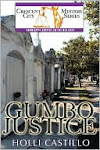 A friend recently read a Facebook status I posted and commented that she wished I could live inside her brain. It made me realize that the distinction between writers and non-writers isn’t just that we write things other people don’t, but that we see the world differently.
A friend recently read a Facebook status I posted and commented that she wished I could live inside her brain. It made me realize that the distinction between writers and non-writers isn’t just that we write things other people don’t, but that we see the world differently.I hear a chainsaw break through the sound of the wind chimes hanging from my porch one blustery, chilly morning. My dogs stop, stare at the window, emit low growls.
My sister would dismiss this whole scene as a neighbor working on his house and tell her dogs to shut up. To me it’s a psychopathic killer, making his way house by house, killing anyone he finds. He uses the chainsaw to cut through the front doors he can’t break into or kick down. And then–
If you’re a writer, you can imagine what comes after the “and then.”
As writers, nothing we see, hear, or otherwise experience, can be taken at face value. A speeding driver isn’t just an obnoxious danger to the road–he is a spy on a mission, a man rushing to the hospital to see the birth of his son, a robber eluding police.
 That light moving through the sky is a Delta Airlines plane to some people. To a writer it is a spaceship from another universe, the plane of a super hero or super villain, or an experimental, top secret mode of military transportation being tested.
That light moving through the sky is a Delta Airlines plane to some people. To a writer it is a spaceship from another universe, the plane of a super hero or super villain, or an experimental, top secret mode of military transportation being tested.To a writer, a cigar is never just a cigar. Even Freud might be surprised at everything a cigar could be or might mean to a writer.
It isn’t just wild imagination that sets us apart–if that were the case, 2-year-olds would be excellent writers. It’s seeing realistic possibilities within our wild imaginations and being able to describe it and share it with others, to give these possibilities form, a plot, characters, and if we do it right, a theme, the whole raison d’etre of our work.
I don’t think my friend would really want me living in her brain. I think it would scare her to see things the way I see them. Or possibly make her slightly schizophrenic, the way I sometimes feel. But I really wouldn’t mind sharing some of my imagination with her, especially when I hear a thump and start imagining all of the possibilities that I know my friend can not.
If I can’t share my brain, at least I can share the crazy ideas that I can formulate into my stories, and hopefully entertain people in the process. And if not, at least my life never seems as boring as it actually is.








